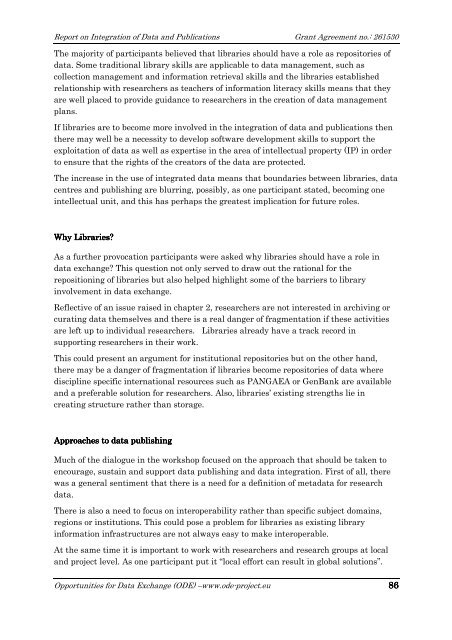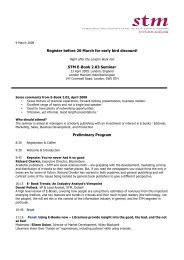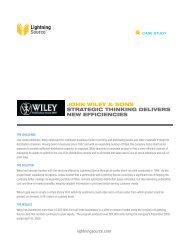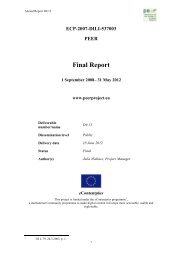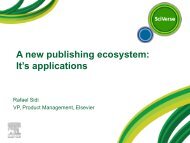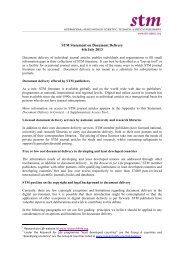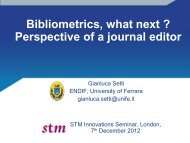Integration of Data and Publications - Alliance for Permanent Access
Integration of Data and Publications - Alliance for Permanent Access
Integration of Data and Publications - Alliance for Permanent Access
You also want an ePaper? Increase the reach of your titles
YUMPU automatically turns print PDFs into web optimized ePapers that Google loves.
Report on <strong>Integration</strong> <strong>of</strong> <strong>Data</strong> <strong>and</strong> <strong>Publications</strong> Grant Agreement no.: 261530<br />
The majority <strong>of</strong> participants believed that libraries should have a role as repositories <strong>of</strong><br />
data. Some traditional library skills are applicable to data management, such as<br />
collection management <strong>and</strong> in<strong>for</strong>mation retrieval skills <strong>and</strong> the libraries established<br />
relationship with researchers as teachers <strong>of</strong> in<strong>for</strong>mation literacy skills means that they<br />
are well placed to provide guidance to researchers in the creation <strong>of</strong> data management<br />
plans.<br />
If libraries are to become more involved in the integration <strong>of</strong> data <strong>and</strong> publications then<br />
there may well be a necessity to develop s<strong>of</strong>tware development skills to support the<br />
exploitation <strong>of</strong> data as well as expertise in the area <strong>of</strong> intellectual property (IP) in order<br />
to ensure that the rights <strong>of</strong> the creators <strong>of</strong> the data are protected.<br />
The increase in the use <strong>of</strong> integrated data means that boundaries between libraries, data<br />
centres <strong>and</strong> publishing are blurring, possibly, as one participant stated, becoming one<br />
intellectual unit, <strong>and</strong> this has perhaps the greatest implication <strong>for</strong> future roles.<br />
Why Libraries?<br />
As a further provocation participants were asked why libraries should have a role in<br />
data exchange? This question not only served to draw out the rational <strong>for</strong> the<br />
repositioning <strong>of</strong> libraries but also helped highlight some <strong>of</strong> the barriers to library<br />
involvement in data exchange.<br />
Reflective <strong>of</strong> an issue raised in chapter 2, researchers are not interested in archiving or<br />
curating data themselves <strong>and</strong> there is a real danger <strong>of</strong> fragmentation if these activities<br />
are left up to individual researchers. Libraries already have a track record in<br />
supporting researchers in their work.<br />
This could present an argument <strong>for</strong> institutional repositories but on the other h<strong>and</strong>,<br />
there may be a danger <strong>of</strong> fragmentation if libraries become repositories <strong>of</strong> data where<br />
discipline specific international resources such as PANGAEA or GenBank are available<br />
<strong>and</strong> a preferable solution <strong>for</strong> researchers. Also, libraries’ existing strengths lie in<br />
creating structure rather than storage.<br />
Approaches to data publishing<br />
Much <strong>of</strong> the dialogue in the workshop focused on the approach that should be taken to<br />
encourage, sustain <strong>and</strong> support data publishing <strong>and</strong> data integration. First <strong>of</strong> all, there<br />
was a general sentiment that there is a need <strong>for</strong> a definition <strong>of</strong> metadata <strong>for</strong> research<br />
data.<br />
There is also a need to focus on interoperability rather than specific subject domains,<br />
regions or institutions. This could pose a problem <strong>for</strong> libraries as existing library<br />
in<strong>for</strong>mation infrastructures are not always easy to make interoperable.<br />
At the same time it is important to work with researchers <strong>and</strong> research groups at local<br />
<strong>and</strong> project level. As one participant put it “local ef<strong>for</strong>t can result in global solutions”.<br />
Opportunities <strong>for</strong> <strong>Data</strong> Exchange (ODE) –www.ode-project.eu 86


